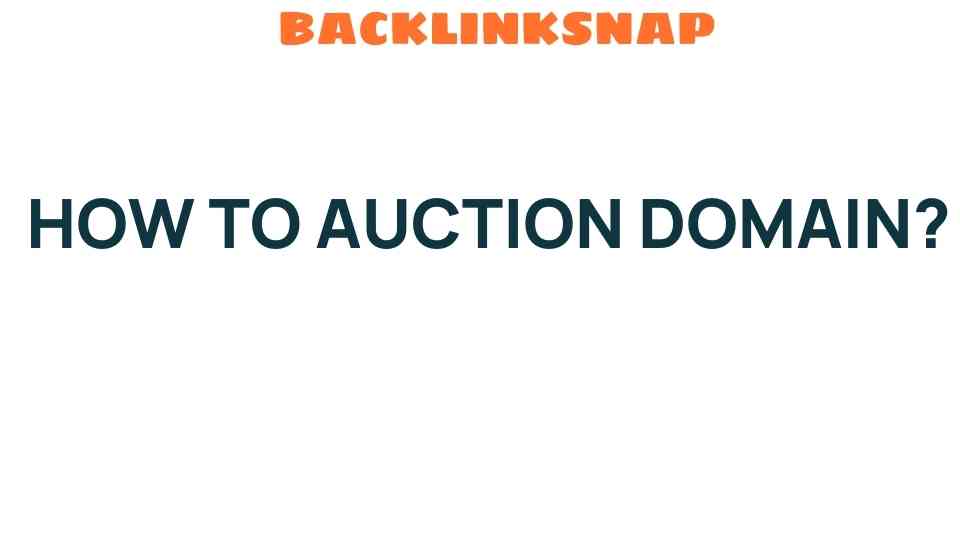How to Auction Domain Names: Unlocking the Secrets to Success
In an increasingly digital world, the value of domain names has skyrocketed. Many individuals and businesses recognize that these digital assets can serve as lucrative investments. If you’re looking to auction domain names, you’re in the right place. This comprehensive guide will equip you with everything you need to know about domain name auctions, selling domains, effective bidding strategies, and understanding domain valuation.
The Appeal of Domain Name Auctions
Domain names are more than just web addresses; they are pivotal components of branding and online identity. As businesses strive to establish their presence online, the demand for premium domain names has also surged. This demand creates an exciting marketplace for domains where sellers can connect with potential buyers through auctions.
Participating in a domain name auction can be a thrilling experience. Not only does it allow you to sell domains you own, but it also provides an opportunity to acquire valuable domains for your own projects. However, navigating this arena requires knowledge of the process, strategies, and market dynamics.
Understanding Domain Valuation
Before diving into auctions, it’s crucial to understand how to value your domains. Factors influencing domain valuation include:
- Keyword Relevance: Domains with popular keywords tend to fetch higher prices.
- Length: Shorter domain names are generally more desirable.
- Brandability: A catchy, memorable domain can be worth significantly more.
- Extension: .com domains usually have a higher value compared to other extensions.
- Age: Older domains can carry more authority and appeal.
To accurately assess your domain’s worth, consider using online valuation tools or consulting with domain appraisal experts.
Choosing the Right Marketplace for Domains
When you’re ready to sell domains, selecting the right auction platform is vital. Here are some popular marketplaces for domains:
- Sedo – One of the largest domain marketplaces, offering a variety of auction formats.
- NameJet – Known for premium domain auctions and expired domains.
- Flippa – A platform for buying and selling websites, apps, and domains.
- Afternic – Focused on domain name sales, providing a vast network for sellers.
Each platform has its unique features, fees, and audience, so take the time to research which one aligns best with your goals.
Crafting a Winning Auction Listing
Your auction listing is your primary tool for attracting bidders. Here’s how to create a compelling listing:
- Title: Use clear, descriptive titles that incorporate relevant keywords.
- Description: Write a detailed description that highlights the domain’s features, potential uses, and value.
- Visuals: If possible, include visuals or brand mockups to help buyers envision the domain’s potential.
Don’t forget to include a fair starting price. Setting the right initial bid can generate interest and lead to competitive bidding.
Bidding Strategies to Maximize Your Sale
Understanding effective bidding strategies can significantly enhance your chances of success in the auction. Here are some tips:
- Research: Study past auctions for similar domains to gauge typical price ranges.
- Set a Budget: Determine your maximum bid before the auction starts to avoid overextending yourself.
- Monitor Activity: Keep an eye on bidding activity and be prepared to adjust your strategy as needed.
- Engage with Potential Buyers: Answer questions and provide additional information to interested bidders.
Utilizing these strategies can help you navigate competitive bidding environments and achieve favorable results.
Post-Auction Considerations
Once the auction concludes, whether you sold your domain or not, there are several important steps to follow:
- Transfer Process: If your domain sells, ensure a smooth transfer by following the auction platform’s guidelines.
- Payment Verification: Always verify that payment is secured before initiating the domain transfer.
- Feedback: Provide feedback about the buyer or seller experience to help improve the community.
Even if your domain didn’t sell, analyze the auction results to refine your approach for future sales.
Frequently Asked Questions
1. What types of domains can be auctioned?
You can auction various types of domains, including expired, premium, and newly registered domains, as long as you have the rights to sell them.
2. How do I determine the right auction price for my domain?
Research similar domains, use domain valuation tools, and consider factors like keyword relevance and length to set a competitive price.
3. Are there fees associated with auctioning my domain?
Yes, most auction platforms charge listing fees, commission fees on sales, or both. Always review the fee structure before proceeding.
4. How long do domain auctions typically last?
Domain auctions can vary in duration, ranging from a few days to several weeks, depending on the platform and auction format.
5. Can I auction my domain if it has existing traffic?
Absolutely! Domains with existing traffic can be more attractive to buyers, potentially increasing their market value.
6. What if my domain doesn’t sell at auction?
If your domain doesn’t sell, you can relist it, adjust the price, or explore other sales avenues, such as direct outreach to potential buyers.
Conclusion
Auctioning domain names can be a rewarding venture if approached with the right knowledge and strategies. By understanding domain valuation, carefully selecting auction platforms, and employing effective bidding strategies, you can unlock the potential of your digital assets. Whether you’re a seasoned trader or a newcomer, the world of domain name auctions offers opportunities for profit and growth. So why wait? Dive in and explore the exciting landscape of domain trading today!
This article is in the category Digital Marketing and created by BacklinkSnap Team




